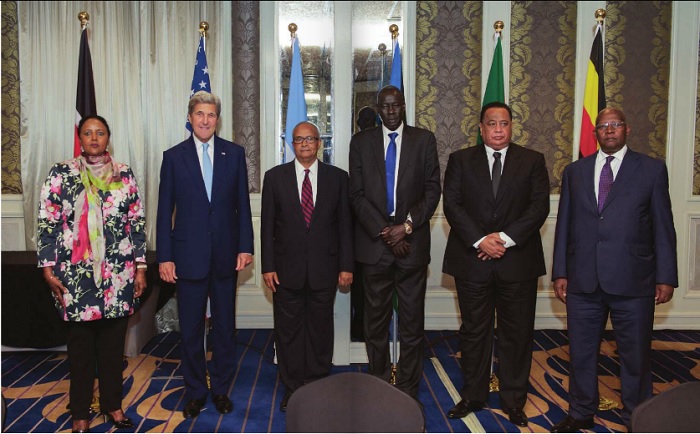
U.S. Secretary of State John Kerry (2nd-L) poses with his fellow Foreign Ministers L-R: Kenyan Foreign Secretary Amina Mohamed, Somalia Foreign Minister Abdisalam Omer, South Sudan Foreign Minister Deng Alor Kuol, Sudan Foreign Minister Ibrahim Ghandour, and Uganda Foreign Minister Sam Kahamba Kutesa after a meeting and working lunch that focused on Somalia and South Sudan on Aug.22 at the Villa Rosa Kempinski Hotel in Nairobi, Kenya. AFP photo
America’s insists on ‘Protection Force’ for South Sudan
South Sudan was at the top of the agenda as U.S. Secretary of State John Kerry met on Aug. 21 with Kenyan President Uhuru Kenyatta and foreign ministers from Kenya, Uganda, Sudan, Somalia, and South Sudan in Nairobi, at the start of a three-country tour, writes Independent Team and Agencies.
Kerry arrived in the Kenyan capital late on Aug.20 for his second trip as secretary of state to Nairobi since May 2015.
During his meeting with his counterparts from eight African nations on Aug. 22, Kerry focused on ways to prevent South Sudan from sliding back into civil war and advance a political transition in Somalia.
The U.S. led the international community into pouring billions of aid into supporting South Sudan when it gained independence in 2011. But the young nation floundered after oil production, which was billed as the major source of revenue to prop it up the young nation, was hit by low global prices for crude.
Soon the specter of ethnic tinged violence returned as President Kiir’s Dinka’s battled Machar’s Nuer in July. Machar suffered defeat, fled into the DR Congo jungles, and was evacuated by the UN.
The secretary of state announced the United States would be giving US$138 million in new aid to South Sudan, which he said would be used for food, water, and medicine for those in need.
He also issued a warning to that country’s leadership.
“But I want to make this clear,” said Kerry. “And I particularly think it is important for the people back home who are engaged in trying to help, I am talking about our taxpayers in the United States. We made it crystal clear, that this is not forever; we are not just going to fill in a void. We are not just going to provide help incessantly if they are not willing to accept responsibility and do the things necessary to deliver to their people. That message was delivered loud and clear today.”
Kerry also said it is urgent to deploy the 4,000-troop regional protection force in South Sudan. The force was recently authorised by the U.N. Security Council and President Kenyatta thanked the U.S. government for sponsoring that resolution.
It is in the interest of many countries in East Africa to deploy this protection force, says Abdullahi Boru Halakhe, a security analyst, according to the VOA. He says the only way of stabilising Juba right now is by doing so.
“Countries like Kenya and Uganda are hosting refugees from South Sudan,” said Halakhe. “They have given aid; the only thing that is left probably is to send peacekeeping troops. The government of Salva Kiir has not been amenable to that, but there is no any other option. Riek Machar cannot go back because a significant number of his military has been decimated so he won’t trust Salva Kiir to give him the military.”
Deadly clashes
The U.S. proposed the force after clashes in South Sudan’s capital last month killed about 300 people and prompted opposition leader Riek Machar to flee the country.
“Let me emphasise, this is not an intervention force, this is a protection force, with a very clear mandate to be able to protect people for their access, their freedom of movement, and their ability to remain free from attack or ambush from any source whatsoever,” said Kerry. “It is supplementary to the sovereignty and the efforts of South Sudan itself. And I think we had a good clearing of the air today, in the discussion that we had with the participants on the subject.”
 The Independent Uganda: You get the Truth we Pay the Price
The Independent Uganda: You get the Truth we Pay the Price


